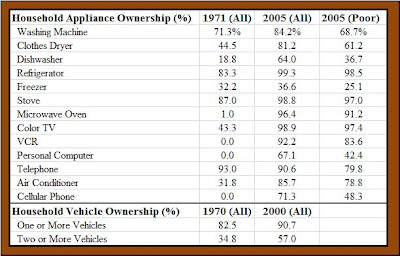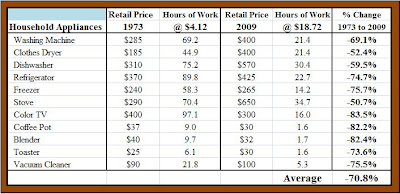The 50's was the highest period of both unions and taxes and the most prosperous time for the middle class
False
--------------
My simple method is combining the best income-distribution estimate (from Pickety&Saez) with the best income-growth estimates (from GDP numbers). This method shows that that between 1970-2008 the real per capita income of the "Bottom 99 Percent" grew by 80%, and the income of the "Bottom 90 Percent" grew by 60%.

...
Real Average Income of "Bottom 99 Percent" 1970-2008:
Not Adjusted, Pickety and Saez: +12%
Adjusted for measurement problems:
CBO: +46%
Combining Pickety&Saez with GDP: +80%
super-economy.blogspot.com
...Then there is the food. I simply don't believe that either Tyler or Paul Krugman have ever, as adults, cooked the way that a 1954 cook did in the most meaningful sense. I don't believe that they have gone without fresh produce for six to eight months at a time, as my mother did in her childhood--and was told to be grateful for the frozen vegetables which hadn't been available when her mother was young. And this was not some urban food desert; my mother grew up in a farm town where the produce, during the summer and early autumn months, is some of the best I've ever had.
Is the shift to flash frozen produce greater, or less great, than the shift from flash frozen to the fresh produce made possible by falling trade barriers, rising air travel, and the advent of container shipping? Does it matter that some of these are political, rather than electrical, innovations?
How many of my readers eat canned seafood (other than tuna?) In a mass market cookbook from the 1950s, the assumption is that when you're talking about shrimp, oysters, clams, or crab, you're talking about something that has been decanted from a metal tin. And of course many other ingredients we now use commonly were not available even in cans to Americans in the 1950s.
And what was available was much more expensive. "Food prepared in the home" consumes less than 10% of the average family budget; in 1950, that figure was almost 30%. It shows in the cookbooks. The Betty Crocker is full of economizing tips: ways to stretch ground beef by adding Wheaties; noodle and rice rings that artfully disguise the fact that there isn't much protein to go around; "one egg" cakes praised for being economical. This was not a handout for welfare recipients; it was expected that the average housewife would be anxiously counting the cost of the eggs and milk used in her baked goods, and looking for ways to stretch out even cheap cuts of meat at the end of the month. Now, I'm sure there are still people in this country who worry about the price of adding an extra egg to their cakes--but they are not the average, or even close to the average. Cooking is both much better, and much easier for those who choose to do it, than it was when my kitchen was built. And the dishwasher knocks twenty or thirty minutes off the time cost of that cooking--not a small improvement.
I haven't even mentioned one of the biggest improvements, which seems to have been overlooked because it isn't a "kitchen" appliance: home air conditioning. Ever canned cherries in July with a broken air conditioner? If you live south of Vermont, and you don't have an air conditioner, probably on those really hot summer days you decide not to cook--you go out, or you buy something pre-prepared from the supermarket, or (if you're in one of those non-1950s kitchens), you thaw something frozen in the microwave. The 1950s cook didn't usually have those choices; either they didn't exist, or she couldn't afford them. No matter how hot it was, she had to go into the kitchen and fire up the stove even to produce "cold" items like potato salad, egg salad, or lemonade. And of course many American women, like my grandmother, canned all summer, either to save money or because they preferred the quality of home canned. We don't do this so much in part because women work, and in part because we no longer eat so much canned food--we have better alternatives. But when we do choose to can, or do any summertime cooking, we do so in greater comfort than my grandmother could have imagined in 1953...
theatlantic.com

mjperry.blogspot.com
---
Also see
Christmas Shopping for a Laptop: 2000 vs. 2009
mjperry.blogspot.com
Christmas Shopping for a VCR/DVD: 1981 vs. 2009
mjperry.blogspot.com
Christmas Shopping for a TV: 1958 vs. 2009
mjperry.blogspot.com

mjperry.blogspot.com


mjperry.blogspot.com

mjperry.blogspot.com
If we really want to know what happened to the poor of 1979, we need to be able to track specific households through time. Fortunately, we can. According to researchers at the University of Michigan, households in the bottom fifth in 1975 earned an average of almost $28,000 more per year by 1991, adjusted for inflation. According to U.S. Treasury data, a whopping 86 percent of households in the bottom fifth in 1979 had climbed out of poverty by 1988.
philly.com
Households are getting smaller, so household income shows worse results than what's actually happening with per person income.
Message 27128075
Poverty is not static for people willing to work. A University of Michigan study shows that only 5 percent of those in the bottom fifth of the income distribution in 1975 remained there in 1991. What happened to them? They moved up to the top three-fifths of the income distribution -- middle class or higher. Moreover, three out of 10 of the lowest income earners in 1975 moved all the way into the top fifth of income earners by 1991. Those who were poor in 1975 had an inflation-adjusted average income gain of $27,745 by 1991. Those workers who were in the top fifth of income earners in 1975 were better off in 1991 by an average of only $4,354. The bottom line is, the richer are getting richer and the poor are getting richer.
Poverty in the United States, in an absolute sense, has virtually disappeared. Today, there's nothing remotely resembling poverty of yesteryear. However, if poverty is defined in the relative sense, the lowest fifth of income-earners, "poverty" will always be with us. No matter how poverty is defined, if I were an unborn spirit, condemned to a life of poverty, but God allowed me to choose which nation I wanted to be poor in, I'd choose the United States. Our poor must be the envy of the world's poor.
townhall.com
Apparently your falsely equating income inequality with absolute wealth for the middle or the poor. The middle class or even the poor are economically better off than they where in the 50s, whether your considering income, consumption, wealth, or the items they have and the conditions they live in.
Inequality isn't nearly as important as the absolute level of poverty for the poor and generally less than rich, but if you do care so much about inequality, wealth inequality has decreased since the 50s

blog.american.com |











